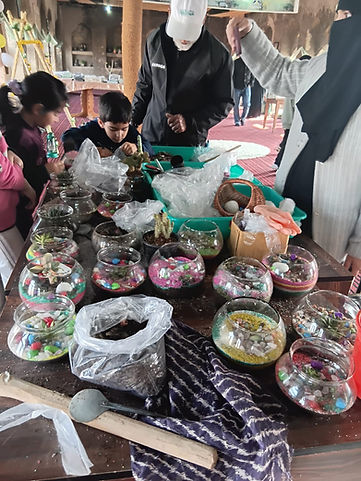

Terrarium Workshop "A Green Step Towards Creativity".
On 8th November 2025, HELP Foundation J&K brought a little magic to Bait-ul-Meeras, Ali Kadal, Srinagar by hosting Kashmir’s first-ever Terrarium Workshop , a day where hearts and hands came together to create tiny green worlds inside glass jars. 🪴💚
Guided by Mr. Mohd Rouf Shah, a horticulture expert with over 31 years of global experience, participants discovered how simple soil, plants, and imagination could bloom into something truly beautiful.
Watching everyone, especially the children, create their own terrariums with such love and wonder was heartwarming. Terrarium making is not just gardening, it’s a mindful art that teaches patience, balance, and respect for nature.
The room was filled with laughter, curiosity, and calm, a reminder that nature’s beauty can fit right in the palm of our hands. Encouraged by the response, HELP Foundation J&K will continue to bring such creative, eco-friendly experiences to communities across the Valley.
"The best way to find yourself is to lose yourself in the service of others."– Mahatma Gandhi
Daibetic And General Health Camp



Felicitation Ceremony for Taekwondo Medalist Mr. Danish Manzoor at Bait Ul Meeras Ali Kadal Srinagar.
Felicitation ceremony was organized on 13th September 2025 at Bait-Ul-Meeras, Aali Kadal Srinagar, by the HELP Foundation J&K in honour of Danish Manzoor, Bronze Medalist from Jammu and Kashmir, who has brought laurels to the country by winning medals at both national and international levels in Taekwondo.
Danish represented India in the 13th Edition of the Elite Cup International Taekwondo Championship, organized by the Jordanian Taekwondo Federation in Amman, Jordan, from 21st to 25th August, where he secured a Bronze Medal for India.
The Chief Guest on the occasion was Mrs. Nighat Shafi Pandit, Chairperson HELP Foundation J&K.
The event witnessed enthusiastic participation of school children, young artists, and dignitaries.
HELP Foundation J&K continues to remain at the forefront in supporting talented children and youth, particularly those deprived of opportunities and resources due to poverty and difficult economic conditions.


Free Health And Diabetes Screaning Camp 2.0 Budgam.
Another successful medical camp was organized in collaboration with My True Care at Budgam. The camp catered to artisans, their families, and the residents of Kanihama and Mazhama. The overwhelming participation and rush of people reflected the community’s trust and the impact of this initiative, with many beneficiaries availing essential healthcare services.


Eye Screaning Camp In Colabration With One Sight
HELP Foundation J&K and OneSight EssilorLuxottica Foundation has long been devoted to extending comprehensive eye care to artisans and underserved communities, safeguarding their vision so they may continue to weave, carve, and uphold the legacy of their craft and livelihood. Continuing this commitment, we recently organized a camp at Eidgah Rathpora, where over a hundred artisans and their families benefitted from free eye examinations, diabetic screenings, expert consultations, and vital health awareness sessions. This initiative was made possible through the collaborative efforts of Sharp Sight Centre, whose professional team and expert doctors led the eye screenings, and My True Care whose renowned diabetologists and general physicians extended their medical expertise to the community. At HELP Foundation J&K, we remain steadfast in our mission to protect the health of the hands that craft Kashmir’s rich heritage, empowering these artisans to continue their timeless artistry for generations to come.

Certificate Distribution Ceremony
A certificate distribution ceremony was held at the HELP Foundation unit in Beerwah, Budgam, to honor the students who successfully completed their courses in Fashion Designing and Computer Applications.
This milestone marks not just the end of a learning journey, but the beginning of new opportunities for these aspiring individuals. We congratulate all the students for their dedication and commitment, and we look forward to seeing them thrive in their respective fields.


Empowering Communities, Transform Lives
HELP Foundation J&K, in collaboration with Mukul Madhav Foundation and Finolex pipes Ltd has launched a comprehensive skill development initiative in the underserved regions of Khag, Khanqah, and Drang in District Budgam.This initiative goes beyond vocational training , it integrates personality development modules, equipping participants not only with practical skills but also with the confidence, communication, and leadership qualities essential for long-term success.By investing in both skills and self-growth, we aim to empower individuals to become self-reliant, resilient, and ready to contribute meaningfully to their communities.Together, we’re creating lasting impact.




%20(1)_edited.png)